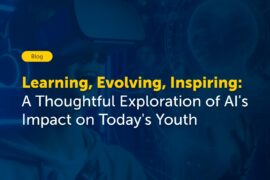
Remember the days when robots were clunky contraptions from sci-fi movies? Today, Artificial Intelligence (AI) isn’t just science fiction—it’s part of daily life, especially for those who grew up with smartphones. This is just the beginning. AI promises an even more personalized future, one where technology anticipates our needs and evolves alongside us. From playlists anticipating every mood to educational platforms adapting to individual learning styles, AI is crafting personalized experiences for the new generation.
As the younger generation navigates technology seamlessly and with familiarity, we must ask: is AI simply a cool tool, or is it fundamentally altering how they learn, interact, and perceive the world?
A United Nations report surveying youth from 36 countries uncovered that nearly all young people (93.2%) view AI and robots positively and embrace their potential. This enthusiasm isn’t just lip service; 80% interact with AI multiple times daily, from education and entertainment to everyday activities.
Organizations, take a note! While the younger generation navigates technology seamlessly, they’re not the only ones who stand to gain from AI’s transformative power. Businesses that fail to keep pace with AI adoption risk losing their competitive edge and missing out on significant opportunities.
Accenture shows that over 60% of businesses believe AI will give them a significant competitive advantage, yet many struggle to implement it effectively. The good news? Young people, already comfortable with AI, can help organizations bridge this gap.
The younger generation, born and raised with AI, isn’t just adapting to it—they’re shaping the future. This shift signifies a pivotal moment for businesses. It necessitates a reevaluation of strategies, products, and services to align with the preferences and behaviors of this technologically savvy demographic. Let’s explore all this and more.
Navigating the AI landscape for the younger generation
With a natural flair for innovation and adaptability, today’s youth embrace AI technology with open arms, seamlessly integrating it into every facet of their lives.
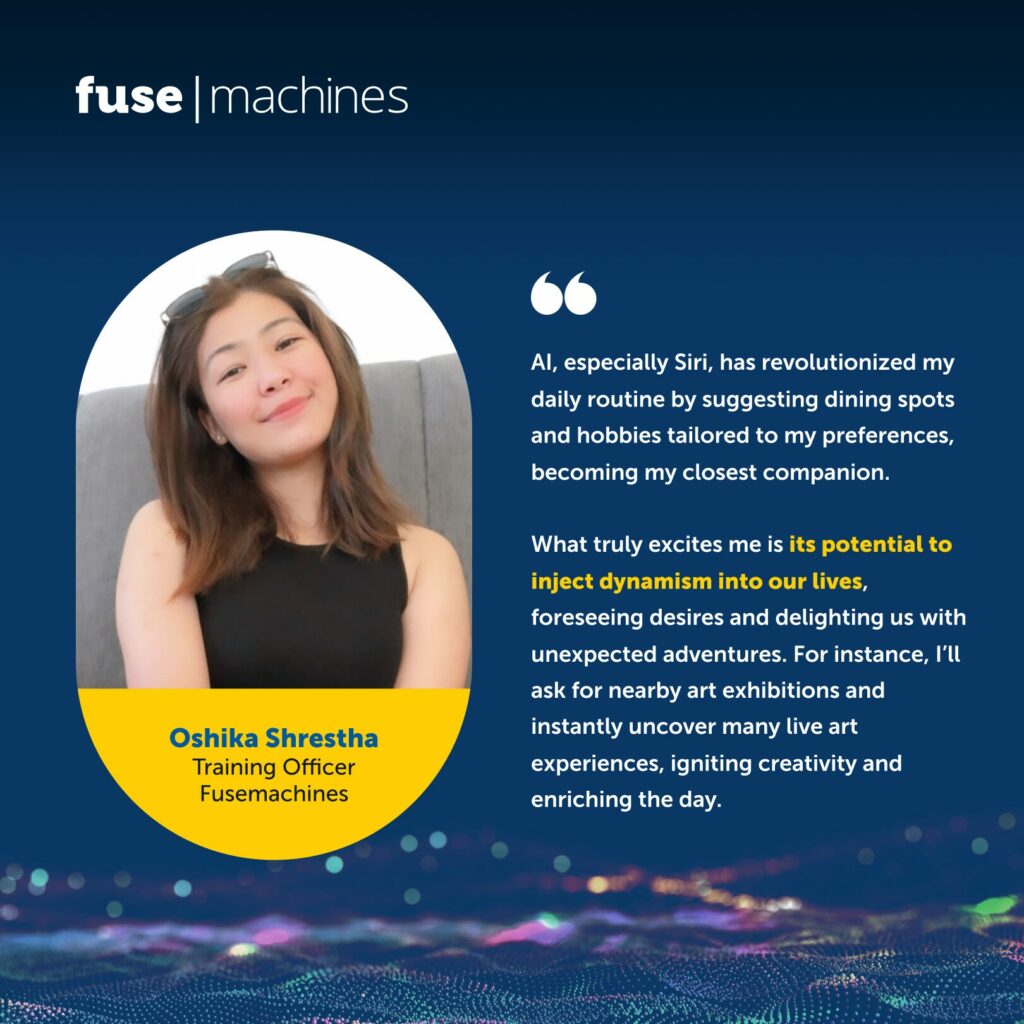
From the moment they wake up to the sound of their AI-powered alarm clocks to the late-night study sessions aided by AI-driven educational platforms, the influence of AI is palpable in every corner of their existence. Let’s delve into how the new generation are not just adapting to but wholeheartedly embracing the AI revolution:
1. Personalized learning experiences
Youngsters are no strangers to the concept of personalized experiences, and AI is revolutionizing education by catering to individual learning styles and preferences. AI-powered tutoring platforms offer tailored lessons and feedback, empowering students to learn at their own pace and easily grasp complex concepts. Adaptive learning algorithms analyze students’ strengths and weaknesses, providing targeted interventions to ensure no one gets left behind.
Students using platforms like Knewton and Khan Academy experience learning from systems capable of building lessons ideal for every individual. These platforms analyze weaknesses and strengths, crafting learning paths that ignite curiosity and optimize understanding.
2. Integration into social interactions
For today’s youth, social media has transformed into a personalized playground fueled by AI. Gone are the days of aimlessly scrolling through irrelevant content. Platforms like TikTok, YouTube, and Instagram leverage sophisticated algorithms to curate feeds tailored to your specific interests and preferences. Think of it as having a digital curator who meticulously selects content that resonates with your unique desires, be it memes, captivating, or trending challenges.
But AI’s impact goes beyond mere suggestion. It ignites creativity and amplifies self-expression. A casual selfie becomes a gateway to a fantastical realm, where AI-powered filters morph your face into a captivating avatar or whimsical effects paint swirling galaxies across your backyard. These playful tools empower you to experiment with your online persona, share your perspective, and forge connections with like-minded individuals who resonate with your passions.
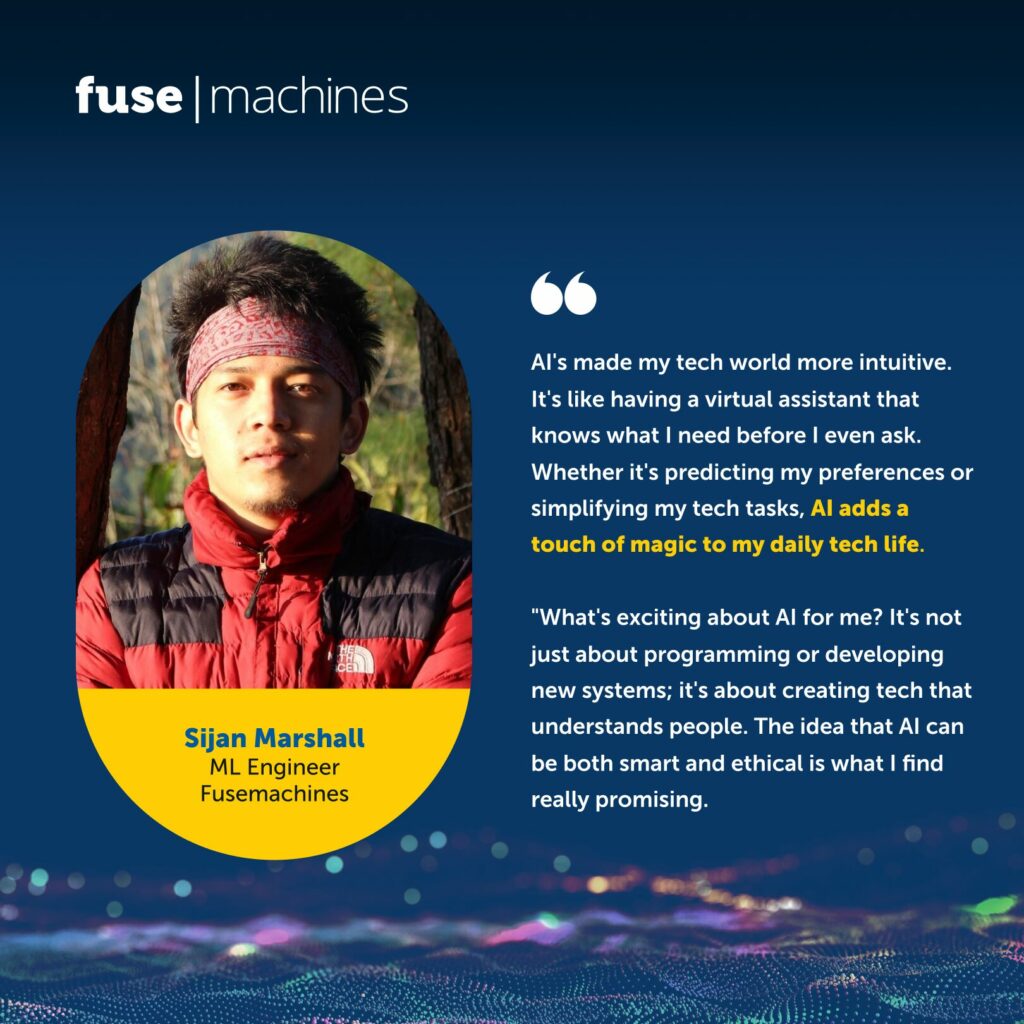
3. AI in daily activities
AI has become an essential part of the daily lives of youth. It isn’t just about making things easier (but who doesn’t love a shortcut?). AI opens up a whole new world of possibilities. For youth, AI can be their personal hype squad, creative partner, or the ultimate wingman, all rolled into one.
Forget boring playlists and endless scrolling! AI-powered recommendation systems personalize entertainment choices, from music and movies to books and games, ensuring that every experience is tailored to individual tastes. Platforms such as Spotify and Netflix leverage AI to curate personalized recommendations, ensuring every song and movie hits just the right note.
4. AI and self-care
AI is reshaping how young individuals approach and prioritize their well-being. Wearables like Fitbits, powered by advanced algorithms, offer real-time health monitoring, empowering teens to stay proactive about their fitness. Apps like Calm use AI to analyze user behavior and recommend personalized strategies for managing stress, improving sleep, and maintaining mental wellness.
Most importantly, AI-enabled telemedicine platforms facilitate convenient access to healthcare professionals, allowing youth to seek medical advice and support from the comfort of their homes, fostering a proactive approach to self-care and preventive health management.
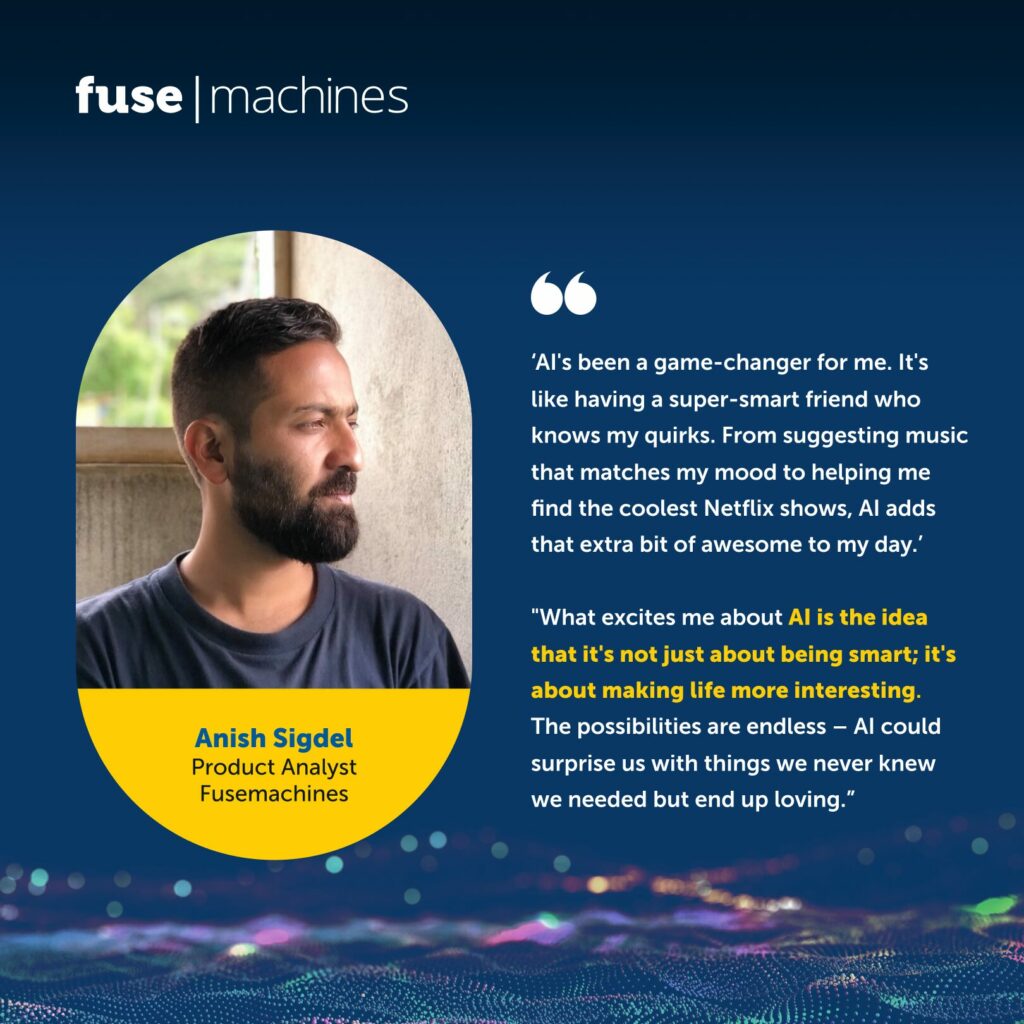
5. AI in entertainment and gaming
Entertainment and gaming has undergone a revolution with the integration of AI, offering immersive experiences that blur the lines between reality and virtual worlds. AI-powered storytelling creates dynamic narratives that adapt to player choices, ensuring a personalized experience with every playthrough.
Virtual reality and augmented reality technologies powered by AI transport players to fantastical realms where imagination knows no bounds. For the musically inclined, AI-powered composition tools let you create personalized soundtracks, while platforms like Netflix and Spotify curate movie and music recommendations tailored to your individual tastes, ensuring every experience resonates.
AI’s influence on youth culture and behavior
The digital world isn’t just evolving for young people; AI is shaping how they think and behave. Having grown with technology, AI has a direct impact on how they perceive themselves, interact with the world, and navigate the complexities of technology, relationships, and reality itself.
1. Social media: Echo chambers and shaping identity
AI algorithms on platforms like TikTok and Instagram wield immense power in shaping social experiences. Curated feeds become echo chambers, amplifying familiar perspectives and potentially creating filter bubbles that limit exposure to diverse viewpoints. This can solidify existing beliefs but also foster a sense of belonging within carefully constructed online communities.
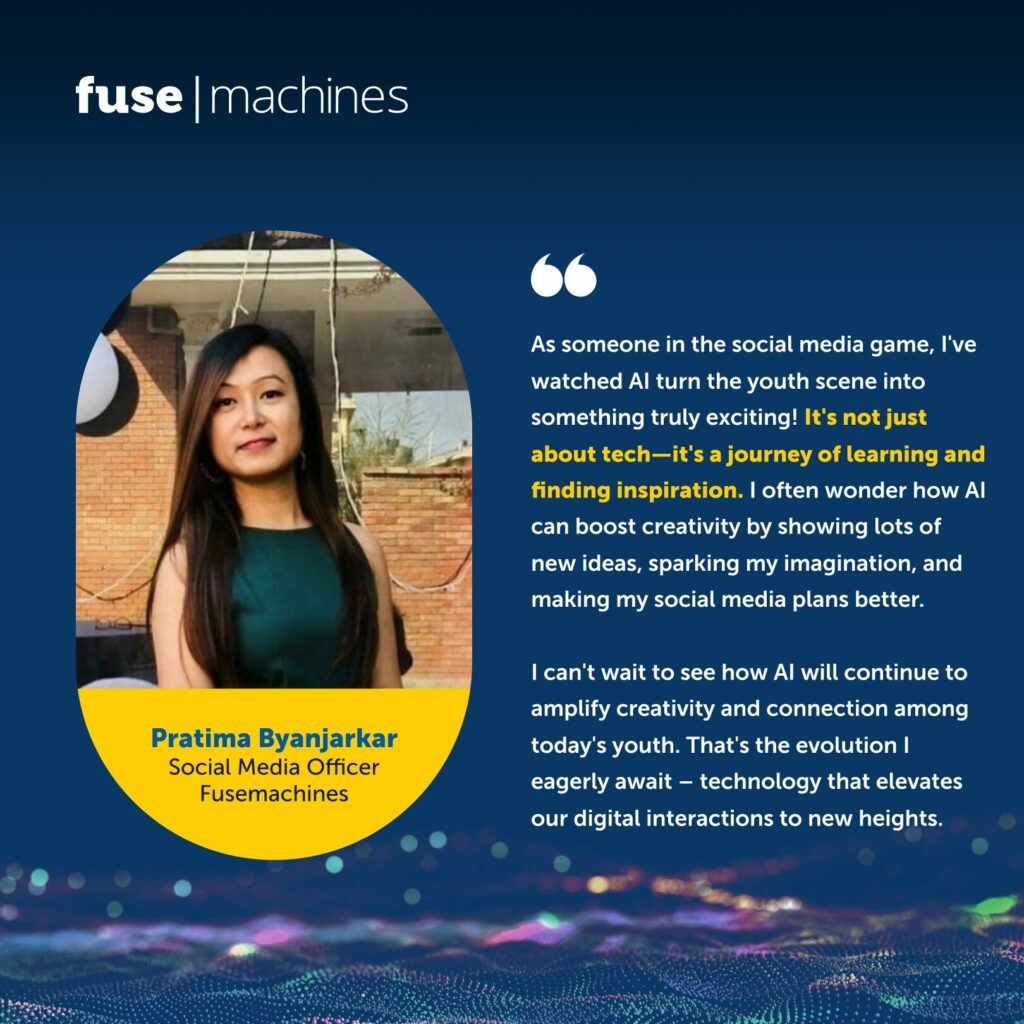
The rise of virtual influencers like Lil Miquela (with 2.6 million followers) blurs the lines between reality and simulation, raising questions about authenticity and representation. Young people grapple with concepts of self-image and identity in a world where the boundaries between real and artificial personas are increasingly blurred.
Want to learn more about our Gen AI Engines? Book a demo now!
To explore our cutting edge AI products for your business, click here.
2. Gaming: Redefining reality and relationships
AI algorithms learn your play style, preferences, and even emotional state, tailoring the gaming experience to your unique desires. Difficulty levels adjust dynamically, narrative choices offer meaningful consequences, and the world reacts in ways that feel relevant and personal.
This level of personalization fosters a sense of ownership and investment in the game world. Players expect their actions to have a tangible impact and demand experiences that adapt to their individual journeys, creating a truly unique and unpredictable gameplay experience.
AI-driven narratives in games like Dragon Age: Inquisition adapt to player choices, creating a sense of agency and personalized storytelling. This fosters a deeper connection to virtual worlds and potentially influences how young people approach decision-making and problem-solving in real life. It also can impact how young people perceive the world around them, potentially opening doors to new perspectives.
3. Entertainment: Algorithmic muses and the curated worldview
From AI-powered music composition tools like Amper Music to personalized recommendations on streaming platforms like Netflix, AI is becoming the curator of entertainment. This personalized landscape caters to individual tastes but also creates potential filter bubbles of content, limiting exposure to diverse perspectives and artistic styles. Algorithms can become gatekeepers, influencing how young people discover and engage with the world of creativity and storytelling.
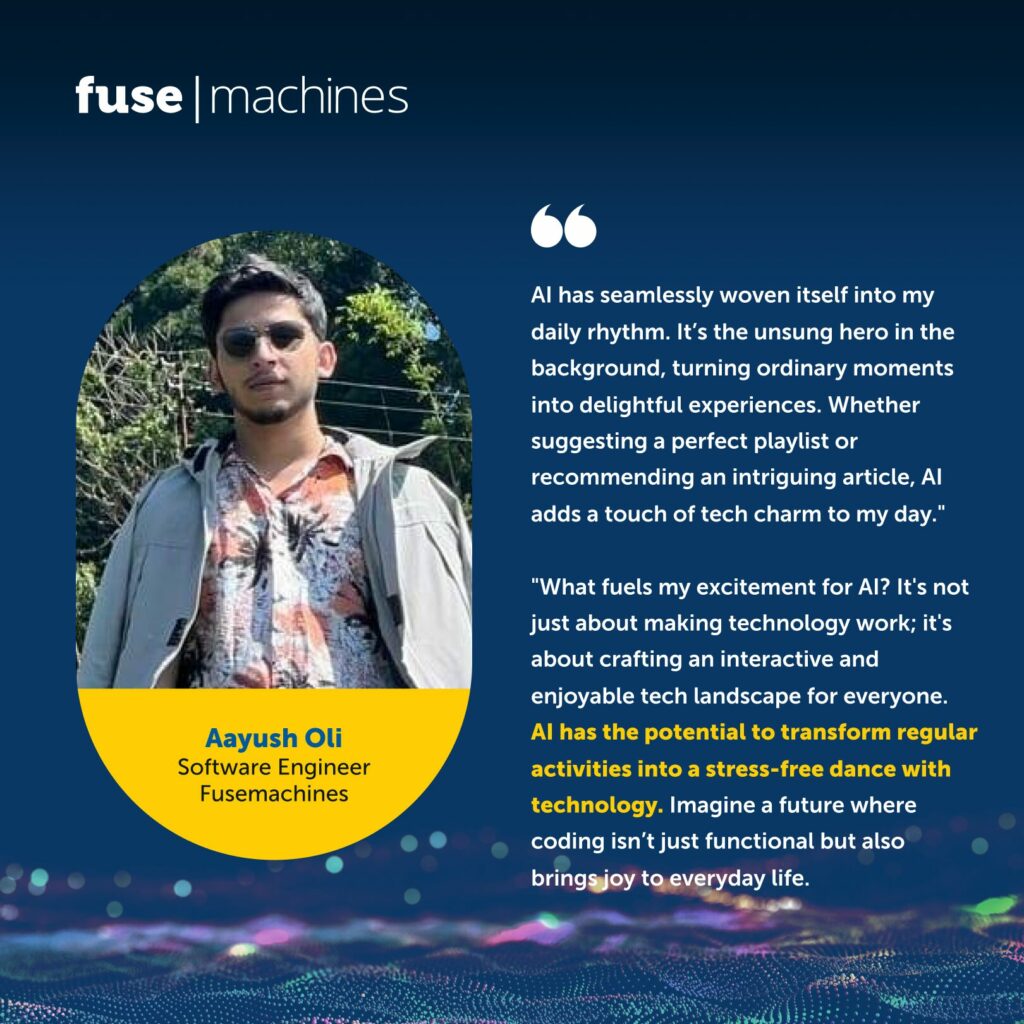
Beyond the surface
The impact of AI goes beyond specific platforms and experiences. It shapes how young people understand technology, influencing their perception of automation, data privacy, and ethical considerations surrounding AI development. It alters the dynamics of relationships, with virtual assistants blurring the lines between human and machine interaction, and social media algorithms influencing how young people form and navigate online communities.
Ultimately, AI’s influence on youth culture and behavior is complex with profound and lasting consequences. Understanding its nuance is crucial for navigating the future of human-technology interaction and ensuring that this technological revolution empowers, rather than limits, the next generation.
Navigating challenges in the AI landscape
Echo chambers and algorithmic bias
AI algorithms can inadvertently create echo chambers, amplifying familiar viewpoints and filtering diverse perspectives. This can solidify existing biases, limit critical thinking, and hinder exposure to new ideas crucial for young minds.
- Approaches
Promoting media literacy
Educating young people about algorithms and their potential biases empowers them to evaluate information and seek diverse perspectives critically.
Supporting platforms with balanced content
Encouraging platforms to prioritize algorithms that curate content from a wider range of viewpoints can broaden young people’s exposure to different opinions and experiences.
Fostering open dialogue
Creating safe spaces for young people to discuss diverse viewpoints and challenge potential biases can equip them with the critical thinking skills necessary to navigate the digital landscape.
Data privacy and security
Young people are often prolific online sharers, leaving a significant digital footprint. This raises concerns about data privacy and security, with potential risks of misuse and exploitation.
- Approaches
Empowering data awareness
Educating young people about data privacy settings and responsible online behavior equips them to protect their information and make informed choices.
Advocating for stronger data protection laws
Lobbying for robust data protection legislation ensures greater control over personal information and minimizes the risk of misuse.
Developing secure technology
Encouraging the development of secure technologies and platforms that prioritize user privacy can further safeguard young people’s online data.
Mental health and well-being
Constant connectivity and curated online experiences can negatively impact mental health, leading anxiety, depression, and comparison.
- Approaches
Promoting digital detox
Encouraging breaks from technology and mindful engagement with the offline world can improve mental well-being and foster healthy digital habits.
Developing responsible AI for well-being
Supporting the development of AI tools that promote mental health awareness and positive online interactions can create a more supportive digital environment.
Prioritizing real-world connections
Encouraging face-to-face interactions and real-world relationships helps maintain emotional balance and counteracts the potential negatives of constant online engagement.
Click here to explore the how Fusemachines transforms your businesses with expert AI products and solutions. To schedule a complimentary consultation today, click here.
Bottom line
The digital world driven by AI isn’t just a landscape to adapt to—it’s a canvas for businesses to co-create with the next generation. Young minds, fluent in AI’s language, hold the key to unlocking its potential. Organizations that partner with them, prioritize responsible development, and embrace ethical considerations will lead the way.
Challenges like privacy and responsible AI use are stepping stones, not roadblocks. By addressing them head-on, we pave the path for a future where AI empowers both young minds and businesses. Education and open dialogue are crucial. Let’s equip young creators with the knowledge and ethics to shape AI for good, sparking creativity, fostering connection, and building a brighter tomorrow for all.
The question isn’t “Will we step up?” but “How high will we aim?” Businesses join hands with the AI generation. Share your vision, leverage their expertise, and together, let’s build a future that celebrates diversity, fuels innovation, and showcases the enduring strength of human-AI collaboration.
Click here to explore the how Fusemachines transforms your businesses with expert AI products and solutions. To schedule a complimentary consultation today, click here.


